|
|
|
Sort Order |
|
|
|
Items / Page
|
|
|
|
|
|
|
| Srl | Item |
| 1 |
ID:
144545
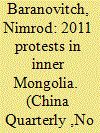

|
|
|
|
|
| Summary/Abstract |
In May 2011, Inner Mongolia experienced the most serious ethnic unrest in the region for 30 years. In this article, I explore the broader context that led to the eruption of the protests, with a particular emphasis on environmental issues. My aim is to explain why environmental issues occupied such a prominent position in the protests, and how these issues were connected to ethnicity. After discussing the material and practical implications of grassland degradation for Mongolian herders, I analyse the symbolic implications of this environmental crisis for the Mongolian educated elite, who have linked environmental issues to ethnic politics and identity. I argue that in the last 20 years or so, Mongolian intellectuals have developed a highly ethnicized environmental discourse, and that this discourse played an important role in informing the 2011 protests. My analysis focuses on this discourse as it is manifested in the domains of art, academia and daily discourse.
|
|
|
|
|
|
|
|
|
|
|
|
|
|
|
|
| 2 |
ID:
144546
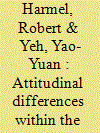

|
|
|
|
|
| Summary/Abstract |
This study addresses whether individuals who were sent down during the Cultural Revolution reveal different political attitudes from those who were socialized during the same period but were not themselves sent down. Using data from the urban sample of the 2006 General Social Survey of China, the authors find evidence that formerly sent-down youth – and particularly sent-down women – as compared to their not-sent-down peers, are today more willing to accept the class-struggle foundation of Mao's communist ideology but are, at the same time, more willing to assess the performance and structure of the communist regime critically.
|
|
|
|
|
|
|
|
|
|
|
|
|
|
|
|
| 3 |
ID:
144536
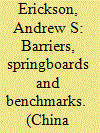

|
|
|
|
|
| Summary/Abstract |
US government reports describe Chinese-conceived “island chains” in the Western Pacific as narrow demarcations for Chinese “counter-intervention” operations to defeat US and allied forces in altercations over contested territorial claims. The sparse scholarship available does little to contest this excessively myopic assertion. Yet, further examination reveals meaningful differences that can greatly enhance an understanding of Chinese views of the “island chains” concept, and with it important aspects of China's efforts to develop as a maritime power. Long before China had a navy or naval strategists worthy of the name, the concept had originated and been developed for decades by previous great powers vying for Asia-Pacific influence. Today, China's own authoritative interpretations are flexible, nuanced and multifaceted – befitting the multiple and sometimes contradictory factors with which Beijing must contend in managing its meteoric maritime rise. These include the growing importance of sea lane security at increasing distances and levels of operational intensity.
|
|
|
|
|
|
|
|
|
|
|
|
|
|
|
|
| 4 |
ID:
144541


|
|
|
|
|
| Summary/Abstract |
This article examines the prominence of various user categories as opinion leaders, defined as initiators, agenda setters or disseminators, in 29 corruption cases exposed on Sina Weibo. It finds that ordinary citizens made up the largest category of initiators but that their power of opinion leadership was limited as they had to rely on media organizations to spread news about the cases. News organizations and online media were the main opinion leaders. Government and Party bodies initiated a fair number of cases and, despite not being strong agenda setters or disseminators, were able to dominate public opinion owing to the fact that news organizations and online media mainly published official announcements about the cases. Media organizations also played a secondary role as the voice of the people. While individuals from some other user categories were able to become prominent opinion leaders, news workers are likely to be the most promising user category to challenge official propaganda.
|
|
|
|
|
|
|
|
|
|
|
|
|
|
|
|
| 5 |
ID:
144539


|
|
|
|
|
| Summary/Abstract |
Since the early 1990s, the Chinese Communist Party (CCP) has put in place a series of measures to allow more Party members to participate in the cadre selection process. “Intra-party democracy” was promoted as a remedy to solve the corruption and social tension that resulted from overly concentrated personnel power. How effective are these formal procedures in constraining the appointment power of core Party leaders and institutionalizing the influence of a larger group of cadres? Drawing on archival research, interviews and quantitative data, this paper examines two components of intra-party democratic reform: “democratic recommendation,” which serves as a gateway to cadre promotion, and the semi-competitive elections at Party congresses. This in-depth study finds that the efforts to expand bottom-up participation are hindered by loopholes in formal regulations, informal practices and the frequent rotation of Party officials. Meanwhile, the reform measures have brought changes to the personnel system by complicating the Party secretaries' exercise of appointment power and altering the incentives of ambitious cadres. The implementation of intra-party democracy could improve the vitality of one-party rule, and its ebbs and flows imply a divide within China's top leadership over the direction of political change.
|
|
|
|
|
|
|
|
|
|
|
|
|
|
|
|
| 6 |
ID:
144538
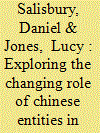

|
|
|
|
|
| Summary/Abstract |
This paper seeks to provide an original examination of the nature of the proliferation of sensitive materials and technologies by Chinese entities. A number of publications have attempted to understand the issue of proliferation stemming from businesses based in China, with many having commented on the efforts undertaken both by international actors and by the Chinese government to prevent it. However, relatively few scholars have sought, in any systematic and sustained way, to understand the types of Chinese companies involved in proliferation and the evolution of their behaviour. This paper seeks to argue and account for the declining role of, and concern regarding, Chinese state-owned enterprise in the global proliferation problem. Different accounts for this change, and the relating proliferation challenge posed by China, are examined.
|
|
|
|
|
|
|
|
|
|
|
|
|
|
|
|
| 7 |
ID:
144544


|
|
|
|
|
| Summary/Abstract |
Gender statistics provide an essential tool to mainstream gender equality in policymaking through the recognition by government and the public of gender differences in all walks of life. One legacy of feminist movements since the 1990s has been a focus on the challenges women face to effect substantive equality with men. Based on the findings of a project carried out in three districts of Tianjin, this paper identifies a lack of gender statistics in China's statistical system and the resulting negative impacts on local policymaking. The findings point to weaknesses in the Chinese “state feminist” approach to gender statistics, mostly at the level of the central government. From a feminist political economy perspective, the paper argues, policymaking in China is a process built upon centralized statistical reporting systems that serve the senior governments more than local communities. Gender statistics have the potential to enhance local governance in China when policymaking becomes a site of contestation where community activists demand the use of statistics to assist policies that promote equality.
|
|
|
|
|
|
|
|
|
|
|
|
|
|
|
|
| 8 |
ID:
144542


|
|
|
|
|
| Summary/Abstract |
Through an investigation of the Shenzhen Collective Consultation Ordinance and the Guangdong Regulations on the Democratic Management of Enterprises, this article demonstrates how transnational capital in China deploys its associational power alongside its structural economic power to lobby and pressure the national and local governments to advance its own interests. In addition, building upon the ideas of Hall and Soskice about the varieties of capitalism, the authors have developed the concept of “varieties of transnational capital” to account for the differing positions of overseas business associations regarding the two laws. We find that these positions are shaped by two determining factors: a) where the associations are situated in global production chains, and b) the industrial relations model in their home countries.
|
|
|
|
|
|
|
|
|
|
|
|
|
|
|
|
| 9 |
ID:
144543


|
|
|
|
|
| Summary/Abstract |
This article examines the process, causes and repercussions of the accession of Taiwan, as a contested state, together with China, to the Asia-Pacific Economic Cooperation in 1991, the first intergovernmental organization that Taipei has joined since 1971. Based on an analysis of elite interviews, primary and secondary data, the paper traces the under-explored diplomatic history of the accession. It argues that changes in Taiwan's domestic and external environments, as well as changes in the diplomatic process, account for Taipei's admission, rather than the China factor alone. The paper examines four positive effects of accession on Taiwan's international space and the implications for Taiwan's continuous survival as a contested state. By undertaking a nuanced analysis of an important yet little explored milestone in the contested state's struggle to mitigate its international isolation, the article sheds light on Taiwan's external ties against the backdrop of the sovereignty dispute between Taipei and Beijing.
|
|
|
|
|
|
|
|
|
|
|
|
|
|
|
|
| 10 |
ID:
144537


|
|
|
|
|
| Summary/Abstract |
During August and September 2012, Sino-Japanese conflict over the Diaoyu/Senkaku Islands escalated. Alongside street demonstrations in China, there was an outpouring of public sentiment on China's leading micro-blog, Sina Weibo (微波). Using human and computer-assisted content analysis, we exploit original Weibo data to measure how public sentiment in China fluctuated over the dispute, and ask two questions. First, how cohesive and volatile were online nationalist sentiments? Second, we measure government censorship of Weibo in order to ask which sentiments did authorities allow to be expressed, and when? We first find that many of the micro-bloggers' harshest invective was directed not at Japan but at their own government. Second, while censorship remained high across topics for most of the dispute, it plummeted on 18 August – the same day as bloggers' anger at Beijing peaked. These observations suggest three theoretical explanations: two are instrumental-strategic (“audience costs” and “safety valve”) and one is ideational (elite identification with protesters).
|
|
|
|
|
|
|
|
|
|
|
|
|
|
|
|
| 11 |
ID:
144540
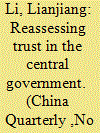

|
|
|
|
|
| Summary/Abstract |
This paper argues that popular trust in the Chinese central government is significantly weaker than five national surveys suggest. The evidence comes from these surveys. First, the surveys show that between one- and two-thirds of respondents hold hierarchical trust, i.e. they have more trust in the central government than they do in local government. Second, all other things being equal, people who are less satisfied with political democracy in China tend to be less trusting of the central government. Finally, hierarchical trust holders tend to be less satisfied with political democracy in the country than those who express equal trust for central and local governments. Put together, the three findings show that hierarchical trust holders are less trusting of the central government than equal trust holders with regard to developing political democracy, although they sound equally confident. The fact that so many respondents hold hierarchical trust indicates that trust in the central government is significantly weaker than it looks.
|
|
|
|
|
|
|
|
|
|
|
|
|
|
|
|
|
|
|
|
|